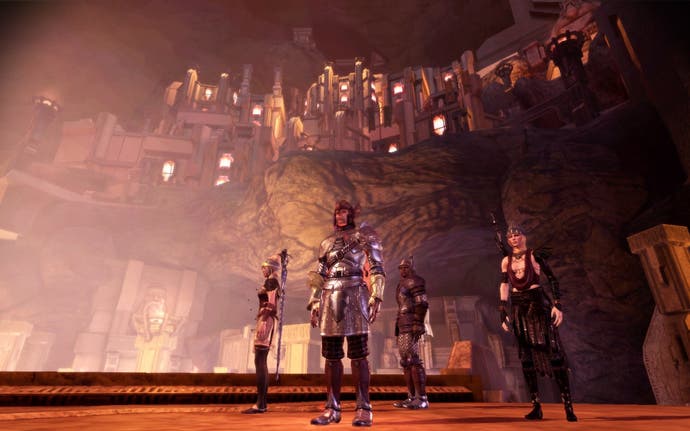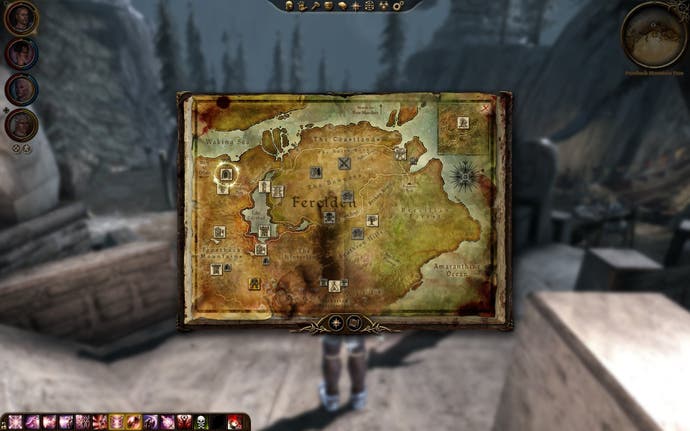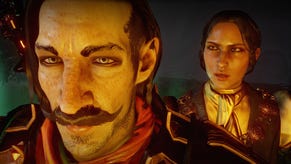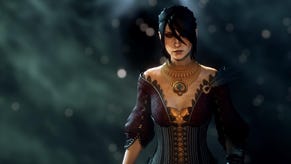Dragon Age: Origins
Drakes' fortune.
When you eventually get there - after a brief spate of questing, more exposition, a lightweight dungeon, a big twist and a limp starter village - you'll discover a polished, thoughtful and flexible party-based RPG that will undoubtedly please fans of the style. If they can hack their way through to it, it will win over a few converts too. That's thanks to its remarkable flexibility.
Dragon Age can be played in real-time, or quasi-turn-based, pausing the action with the space bar to queue up skills. You can use a third-person camera or a tactical top-down view, WASD or mouse-click for movement. You can micro-manage every move of your four-man party, or stick with one character (whether it's the player character or one of the roster of companions) and let the preset or programmable Tactics system take care of the rest. This isn't quite as effective or as boldly automated as Final Fantasy XII's Gambits, but it's still a great alternative for players who like to do their thinking in advance and then watch the action play out. It's all controlled through a superlative PC game interface - attractive, accommodating, simple and precise.
Mechanically speaking, then, Dragon Age does a pretty good job of being all things to all men, and brings the best out of itself with some challenging and well-designed encounters with bosses or large groups of tough enemies. Unfortunately, it undermines this good work to an extent with its difficulty settings.
There's a huge gulf between the completely mindless Easy and the demanding Normal. On the latter, you'll either have to be a Tactics genius or prepared to pause and micro-manage frequently to get through tougher fights, and even veteran RPG players with a full command of the game's skills will find some regular pulls or mini-bosses turning into epic wars of attrition that will drain their stocks of consumables. That's all fair enough, of course, but without a smooth step up from Easy, it cramps what should have been an expansive middle ground for novice players who wanted to get deeper into the game. Dragon Age is either a pushover or a hardcore RPG.

At least you can't really say that of the classes. Although the mage, warrior and rogue archetypes are basic - and though warriors and rogues share a lot of common ground in weapons skills - there are multiple tiers of customisation in each. The powerful and flavoursome specialisations are nicely embedded in the game's storyline and characters to the extent that it would be a spoiler to say how you can pick them up.
Even without them, the shallow-but-wide talent trees and common passive skills - including coercion, which unlocks more conversational options and story possibilities - give plenty of scope for crafting an individual character. Levelling is well-paced and so are the loot rewards (so long as you like them occasional, and meaningful).

All of this you will begin to appreciate when you undertake the first of the four main branches of the plot, which can be attempted in any order as your character aims to recruit four important factions to the Grey Wardens' cause. By this point, you'll also have Alistair and Morrigan with you.
Although everyone will have their own favourites (I'm partial to the hilariously terse warrior Sten, purely because he seems to enjoy making an impossible, contrary mockery of the game's careful art of conversation) these two are the stars of the game's cast of companions. Likeable, open-hearted Grey Warden Alistair and irascible vixen-witch Morrigan are as charismatic as the stars of, say, Uncharted 2. That's remarkable, considering not just the complex depth of interaction with them, but also, sadly, the endless tracts of wooden script they have to battle through, their stiff and lifeless animation, and their contrived storylines.
















